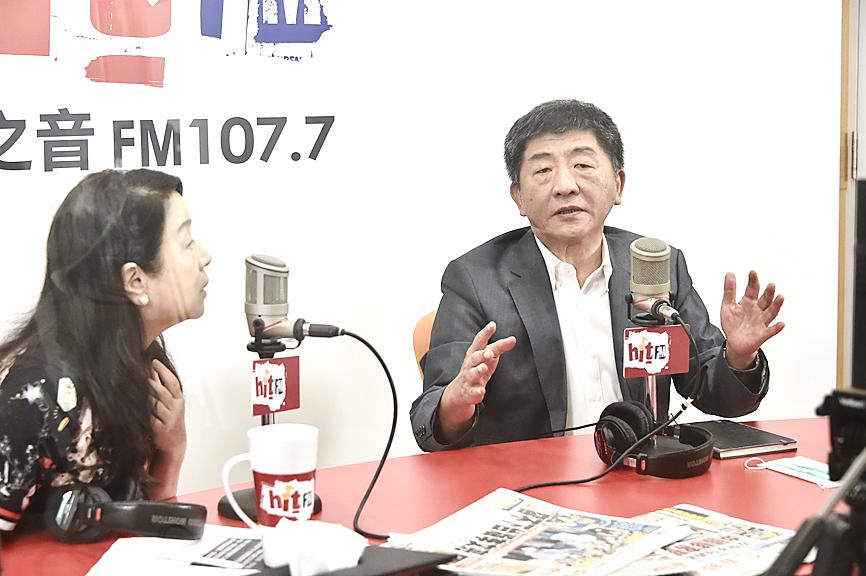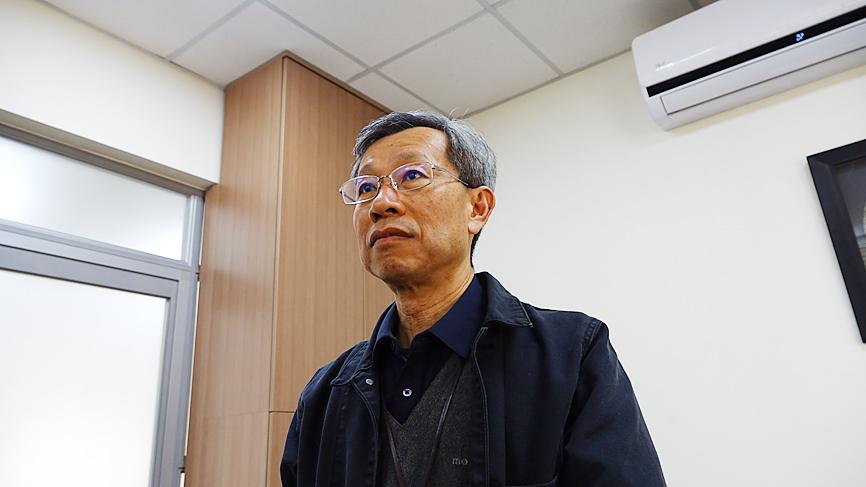President Tsai Ing-wen (蔡英文) yesterday lauded Minister of Health and Welfare Chen Shih-chung (陳時中) for his leadership of the Central Epidemic Command Center (CECC) in containing COVID-19, while the the Changhua County Public Health Bureau’s testing of a teenager who had shown no symptoms after returning from the US sparked debate and a Department of Civil Service Ethics investigation.
Taiwan’s achievements in containing the COVID-19 pandemic so far show that a democracy can tackle the challenge without concealing cases, Tsai wrote on Facebook.
As the global pandemic remains severe, the nation needs the CECC to continue making professional and timely decisions, she said, adding that Taiwan needs solidarity and mutual support.

Photo: Tu Chien-jung, Taipei Times
The center on Monday reported an imported case of COVID-19 — the nation’s 485th case — a Taiwanese teen who lives in the US and arrived on Aug. 5 for a family visit.
The teen had not shown any virus symptoms since his arrival, but on Saturday last week was tested by local health authorities, it said.
Asked why someone with no symptoms was tested, Centers for Disease Control (CDC) Deputy Director-General Chuang Jen-hsiang (莊人祥), the CECC’s spokesman, on Tuesday said that Chen has instructed the ministry’s Department of Civil Service Ethics to investigate.

Photo: Liu Hsiao-hsin, Taipei Times
The purpose of the probe is to clarify the facts, Chen said on Wednesday.
Reiterating his position during a radio interview yesterday, Chen said he understands Changhua Public Health Bureau Director Yeh Yen-po’s (葉彥伯) position that scientific evidence supports testing people who have no symptoms, but the Changhua bureau should have informed the CECC first.
Chen said the Changhua bureau had conducted virus tests for hundreds of people under quarantine over the past six months without informing the CECC.
Speaking at the Chinese Nationalist Party’s (KMT) headquarters in Taipei yesterday, KMT deputy secretary-general Lee Yen-hsiu (李彥秀) said attempts online to discredit the Changhua bureau have damaged the morale of the nation’s frontline healthcare workers.
If the local and central governments have a difference of opinion regarding the handling of COVID-19, or procedures, the CDC should communicate with local health departments to understand the situation, instead of using the Department of Civil Service Ethics, she said.
“If director Yeh had not done this, perhaps no one would have discovered this case,” she added.
Asked whether Chen’s order to investigate Yeh was excessive, Premier Su Tseng-chang (蘇貞昌) asked whether it was right for Yeh to order a person to break quarantine to be screened for COVID-19 and whether the move conformed to the CECC’s standard operating procedures.
Disease prevention efforts should be consistent from the central government down, he said, adding that the central government would back Chen’s decision.
Separately, Yeh said that when a person under quarantine needs to visit a hospital for COVID-19 testing, local health bureaus arrange a taxi or an ambulance for the person, as the central government only bans quarantined patients from taking public transportation.
If no taxis or ambulances are available, the person might need to drive to the hospital, while hospitals are asked to help keep track of their location, he said.
However, Yeh’s comments sparked debate over whether local testing procedures might differ from the CECC’s policies and create loopholes in disease prevention measures.
As Yeh also serves as chairman of the Taiwan Association of Medical Screening, some people question whether he tested the teen as part of promoting universal screening.
The association is irrelevant in this case, as it targets cancer and chronic diseases, Yeh said on Wednesday.
Yesterday, the CECC reaffirmed its policy of not adopting universal screening, as it rejected media reports that Taiwan plans to test all arrivals from 12 “high-risk” countries and regions.
The pandemic is still severe in many nations, so Taiwan pays close attention to the virus situation in “high-risk” countries and regions, and continues to weigh the feasibility of prevention measures against their effects, and weigh the threat of virus situations overseas against domestic disease prevention efforts, the center said.
However, there is currently “no specific plan” to test all arrivals, the center said, adding that any need for additional measures would be explained to the public.
Taiwan currently only tests all arrivals from the Philippines.
Additional reporting by Sean Lin and Chang Tsung-chiu

SECURITY: As China is ‘reshaping’ Hong Kong’s population, Taiwan must raise the eligibility threshold for applications from Hong Kongers, Chiu Chui-cheng said When Hong Kong and Macau citizens apply for residency in Taiwan, it would be under a new category that includes a “national security observation period,” Mainland Affairs Council (MAC) Minister Chiu Chui-cheng (邱垂正) said yesterday. President William Lai (賴清德) on March 13 announced 17 strategies to counter China’s aggression toward Taiwan, including incorporating national security considerations into the review process for residency applications from Hong Kong and Macau citizens. The situation in Hong Kong is constantly changing, Chiu said to media yesterday on the sidelines of the Taipei Technology Run hosted by the Taipei Neihu Technology Park Development Association. With

CARROT AND STICK: While unrelenting in its military threats, China attracted nearly 40,000 Taiwanese to over 400 business events last year Nearly 40,000 Taiwanese last year joined industry events in China, such as conferences and trade fairs, supported by the Chinese government, a study showed yesterday, as Beijing ramps up a charm offensive toward Taipei alongside military pressure. China has long taken a carrot-and-stick approach to Taiwan, threatening it with the prospect of military action while reaching out to those it believes are amenable to Beijing’s point of view. Taiwanese security officials are wary of what they see as Beijing’s influence campaigns to sway public opinion after Taipei and Beijing gradually resumed travel links halted by the COVID-19 pandemic, but the scale of

A US Marine Corps regiment equipped with Naval Strike Missiles (NSM) is set to participate in the upcoming Balikatan 25 exercise in the Luzon Strait, marking the system’s first-ever deployment in the Philippines. US and Philippine officials have separately confirmed that the Navy Marine Expeditionary Ship Interdiction System (NMESIS) — the mobile launch platform for the Naval Strike Missile — would take part in the joint exercise. The missiles are being deployed to “a strategic first island chain chokepoint” in the waters between Taiwan proper and the Philippines, US-based Naval News reported. “The Luzon Strait and Bashi Channel represent a critical access

Pope Francis is be laid to rest on Saturday after lying in state for three days in St Peter’s Basilica, where the faithful are expected to flock to pay their respects to history’s first Latin American pontiff. The cardinals met yesterday in the Vatican’s synod hall to chart the next steps before a conclave begins to choose Francis’ successor, as condolences poured in from around the world. According to current norms, the conclave must begin between May 5 and 10. The cardinals set the funeral for Saturday at 10am in St Peter’s Square, to be celebrated by the dean of the College